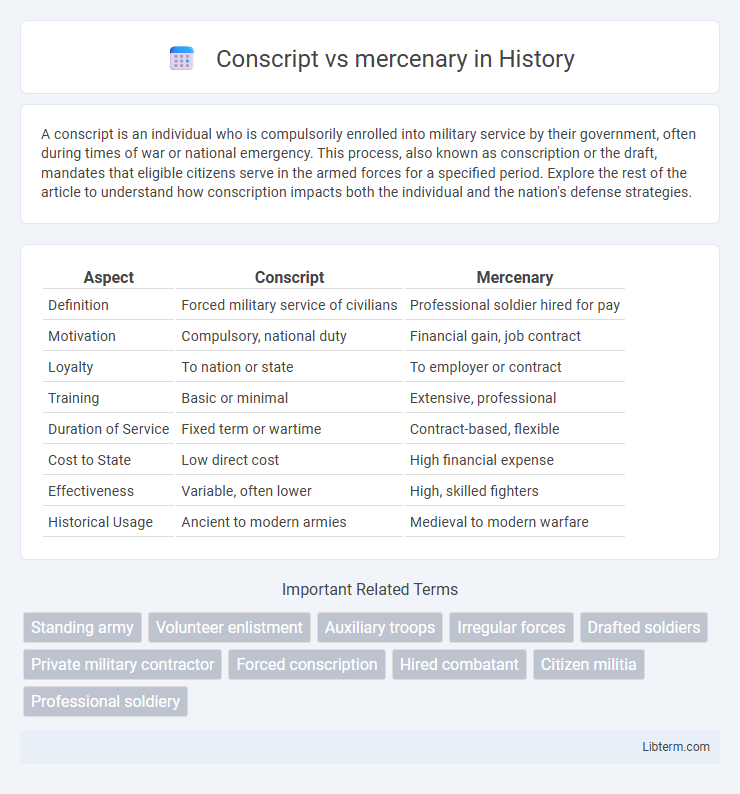A conscript is an individual who is compulsorily enrolled into military service by their government, often during times of war or national emergency. This process, also known as conscription or the draft, mandates that eligible citizens serve in the armed forces for a specified period. Explore the rest of the article to understand how conscription impacts both the individual and the nation's defense strategies.
Table of Comparison
| Aspect | Conscript | Mercenary |
|---|---|---|
| Definition | Forced military service of civilians | Professional soldier hired for pay |
| Motivation | Compulsory, national duty | Financial gain, job contract |
| Loyalty | To nation or state | To employer or contract |
| Training | Basic or minimal | Extensive, professional |
| Duration of Service | Fixed term or wartime | Contract-based, flexible |
| Cost to State | Low direct cost | High financial expense |
| Effectiveness | Variable, often lower | High, skilled fighters |
| Historical Usage | Ancient to modern armies | Medieval to modern warfare |
Introduction to Conscripts and Mercenaries
Conscripts are individuals compulsorily enlisted into military service, often through a draft system mandated by governments during wartime or national emergencies. Mercenaries are professional soldiers hired to fight for a foreign army or entity, motivated primarily by financial gain rather than national allegiance. While conscripts serve out of obligation to their country, mercenaries operate under contractual agreements and are considered private military contractors.
Historical Origin and Evolution
Conscripts, originating from ancient civilizations such as Rome and Sparta, were legally mandated soldiers drafted from the civilian population to serve in national armies, reflecting the state's authority to mobilize manpower for defense or conquest. Mercenaries trace back to the ancient Greek hoplites and later medieval Europe, where professional soldiers sold their services to the highest bidder, operating independently of national allegiance. Over time, conscription evolved with the rise of centralized states and nation-states, institutionalizing compulsory military service, while mercenaries became formalized into private military companies during the modern era, emphasizing profit-driven warfare.
Defining Conscripts: Mandatory Military Service
Conscripts undergo mandatory military service enforced by government conscription laws, requiring eligible citizens to serve for a specific duration. Unlike mercenaries who are privately hired for combat roles, conscripts are primarily civilians obligated to join their national armed forces during peacetime or wartime. This compulsory service ensures a ready pool of trained personnel to sustain national defense capabilities without direct financial incentives.
Understanding Mercenaries: Soldiers for Hire
Mercenaries are professional soldiers hired to fight for a foreign army, operating independently of national conscription laws that bind conscripts. Unlike conscripts, who serve mandatory military terms imposed by their government, mercenaries offer specialized combat skills in exchange for monetary compensation, often participating in conflicts driven by private interests rather than national duty. Their role in modern warfare emphasizes flexibility, expertise, and contractual obligations, distinguishing them from conscripts who serve as part of a nation's compulsory defense strategy.
Recruitment Methods and Motivations
Conscript recruitment relies on compulsory enlistment through government mandates or national service laws, often targeting eligible civilian populations during wartime. Mercenaries are recruited voluntarily, typically through private contracts or direct payment, motivated primarily by financial gain and personal advantage. While conscripts serve due to legal obligation or patriotism, mercenaries prioritize profit and may operate under private military companies or as independent fighters.
Training and Preparedness Comparison
Conscripts typically receive basic, short-term training focused on fundamental combat skills and discipline, which limits their overall preparedness for complex battlefield situations. Mercenaries undergo extensive, specialized training tailored to diverse combat environments and advanced tactics, enhancing their effectiveness and adaptability in high-risk operations. The disparity in training intensity and duration significantly impacts the combat readiness and strategic value of conscripts versus mercenaries.
Ethical and Legal Considerations
Conscripts are typically compelled by law to serve in the military, raising ethical questions about personal autonomy and forced participation in armed conflict, whereas mercenaries operate voluntarily for financial gain, often blurring legal boundaries under international law. The Geneva Conventions and the United Nations Mercenary Convention seek to regulate mercenary activities but generally exempt conscripts, emphasizing their legal status as lawful combatants. Ethical debates intensify over mercenaries' accountability and motivations, contrasting with conscripts' mandated service, which implicates state responsibility and the protection of individual rights.
Performance on the Battlefield
Mercenaries often demonstrate superior battlefield performance due to specialized training, higher motivation, and experience in diverse combat scenarios, resulting in greater tactical adaptability and effectiveness. Conscripts typically have limited training and lower morale, which can reduce their combat efficiency and responsiveness under pressure. The disparity in skill and commitment usually makes mercenaries more reliable in complex or high-stakes military operations.
Societal Impact and Perceptions
Conscripts often face social stigma due to forced service, leading to mixed public perceptions that can affect community morale and trust in government institutions. Mercenaries, driven by profit rather than patriotism, are frequently viewed with suspicion and sometimes contempt, impacting their acceptance within societies. The reliance on mercenaries can undermine national sovereignty and provoke ethical debates, whereas conscription impacts societal cohesion by enforcing uniform participation in defense.
Conscript vs Mercenary: Which Is More Effective?
Conscripts provide large, cost-effective manpower with basic military training, making them suitable for defensive or auxiliary roles but often lacking in motivation and specialized skills. Mercenaries offer highly skilled, experienced soldiers motivated by pay, enabling rapid deployment and effectiveness in complex operations, albeit at a higher financial cost and potential loyalty risks. Effectiveness depends on mission objectives, with conscripts excelling in sustained, large-scale conflicts and mercenaries outperforming in precision, tactical operations.
Conscript Infographic

 libterm.com
libterm.com